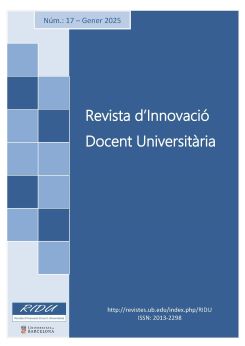Wikireflection: a virtual learning space for reflection and understanding of theoretical sources
DOI:
https://doi.org/10.1344/RIDU2025.17.9Keywords:
Wiki, Collaborative learning, Reflective thinking, Social WorkAbstract
The educational and academic potentialities that the Wiki tool allows in university education are multiple. The Wiki tool consists of a virtual page for collaborative writing, where students can add and change the contents of the page. This tool facilitates educational strategies such as a greater interaction between students and teachers -and between peers- and a deeper understanding of the content, while enhancing reasoned reflection and favoring the expression of own ideas. To do this, we have created a learning space called Wikireflection, which we develop as part of a course of the Social Work Degree at the University of Barcelona. This initiative has been recognized as innovative teaching by the Vice-Rector’s Office for Teaching Policy and by the Research, Innovation and Improvement of Teaching and Learning Program (RIMDA, University of Barcelona).
In this article we explore the potentialities of this virtual tool that allow to improve the reflection and understanding of the course’s bibliography. We reflect on the pedagogical bases that support this learning space in the context of the course. Next, we place the Wiki activity in the framework of our teaching, explain its development and organization and finally show the results that are being produced with the use of the Wiki.
References
Alomar, E., Calabuig, F., Martí, M., Pérez, M. Simón, Q., i Simon J. (2009). El Wiki: un nou entorn afavoridor del treball en grups d’aprenentatge cooperatius. II Congrés Internacional UNIVEST 09: ‘Claus per a la implicacions dels estudiants a la universitat’. Girona, 12 i 13 de novembre. http://hdl.handle.net/10256/2016
Arendt, H., i Khon, J. (2006). Between past and future. Penguin.
Beck, U. (2006). Cosmopolitan vision. Polity Press.
Brockbank, A., i McGill, I. (2007). Facilitating reflective learning in higher education. McGraw-Hill Education.
Delval, J. (1997). Hoy todos son constructivistas. Cuadernos de Pedagogía, 257, 78-84.
Dewey, J. (1933). How we think: A restatement of the relation of reflective thinking to the educative process. D. C. Health y Co Publischers.
Fernández García, J. R. (2005). La plataforma educativa Moodle: el presente y el futuro. Linux User Educación, 15, 80-84.
Fusaro, D. (2022). Pensar diferente. Filosofia del disenso. Trotta.
Garcés, M. (2020). Escola d’aprenents. Galaxia Gutenberg.
Garrison, D. R., i Archer, W. (2000). A transactional perspective on teaching and learning: A framework for adult and higher education. Pergamon.
Gavilán, P., i Alario, R. (2010). Aprendizaje cooperativo. Una metodología con futuro. Principios y aplicaciones. CCS.
Gros, B. (2002). Constructivismo y diseño de entornos virtuales de aprendizaje. Revista de Educación, 328, 225-247.
Hazari, S., North, A., i Moreland, D. (2009). Investigating pedagogical value of Wiki technology. Journal of Information Systems Education, 20(2), 187-198.
Lamb, B. (2004). Wide open spaces: Wikis, ready or not. Educase Review, 39(5), 36-48.
Leuf, B., i Cunningham, W. (2001). The Wiki way: quick collaboration on the web. Addison Wesley.
Mancho, G., Porto, M. D., i Valero, C. (2009). Wikis e innovación docente. Red-U Revista de Docencia Universitaria, 7(3), 1-17. https://doi.org/10.4995/redu.2009.6258
Martínez, F., i Prendes, M. P. (2006). Actividades individuales versus actividades colaborativas. En J. Cabero, i P. Román (Coords.), E-actividades. Un referente básico para la formación en Internet (pp.183-202). Eduforma.
Michéa, J. C. (2002). La escuela de la ignorancia. Acuarela Libros.
Morin, E., Ciurana, E. R., i Mota, R. D. (2002). Educar en la era planetaria. El pensamiento complejo como método de aprendizaje en el error y la incertidubre humana. Universidad de Valladolid, Unesco, IIPC, USAL.
Ordine, N. (2013). La utilitat de l’inútil. Quaderns Crema.
Pérez, A. (2023). Las falsas alternativas. Pedagogía libertaria y nueva educación. Virus editorial.
Raman, M., Ryan, T., i Olfman, L. (2005). Designing knowledge management systems for teaching and learning with Wiki technology. Journal of Information Systems Education, 16(3), 311-320.
Robles, S., Borrell J., Fernández-Córdoba, C., Freixas, M., Pèlachs, A., Pons, J., i Sebastián, R. M. (2009). Wiki en la Universitat Autónoma de Barcelona. RED Revista de Educación a Distancia, 7(3), 1-24.
Sangrà, T., López, J. A., i Iannitelli, S. (2022). Conocimiento y aprendizaje desde la asignatura de rol e identidad del trabajo social . Itinerarios De Trabajo Social, 2, 17-25. https://doi.org/10.1344/its.i2.36354
Schwartz, L., Clark, S., Cossarin, M., i Rudolph, J. (2004). Educational Wikis: features and selection criteria. The International Review of Research in Open and Distributed Learning, 5(1), 1-6. https://doi.org/10.19173/irrodl.v5i1.163
Toker, S., Moseley, J. L., i Chow, A. T. (2008). Is there a Wiki in your future?: Applications for education, instructional design, and general use. Educational Technology Publications, 48(5), 22-27.
Trentin, G. (2009). Using a Wiki to evaluate individual contribution to a collaborative learning project. Journal of Computer Assisted Learning, 25(1), 43-55. https://doi.org/10.1111/j.1365-2729.2008.00276.x
Wheeler, S., i Wheeler, D. (2009). Using Wikis to promote quality learning in teacher training. Learning, Media and Technology, 34(1), 1-10.
Downloads
Published
Issue
Section
License
Copyright (c) 2025 Toni Sangrà

This work is licensed under a Creative Commons Attribution 4.0 International License.
Authors whishing to publish in this journal agree to the following conditions:
- The author or author retain copyright and grants the journal the right of first publication of the paper.
- The texts will be published under license "Reconocimiento Creative Commons 4.0 España", which allows to share, distribute, reproduce and the public communication of the paper, as long as the name of the author or authors and the journal are clearly stated.







